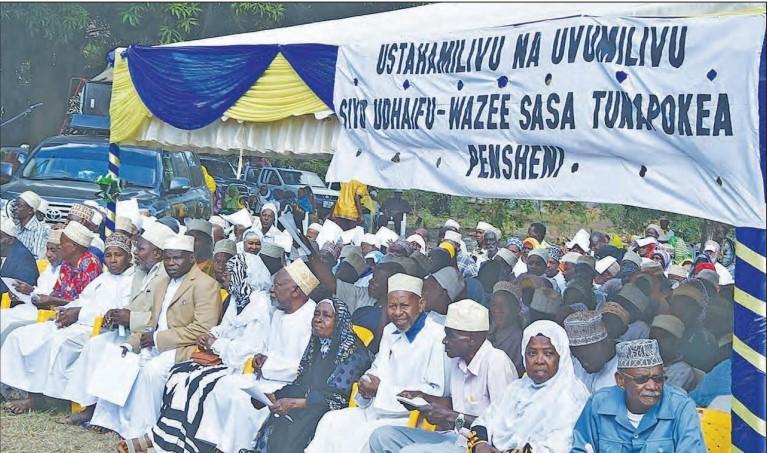Africa-Press – Tanzania. IN an era where the aging population often feels sidelined, Zanzibar is emerging as a beacon of hope for senior citizens, thanks to the vision and leadership of President Dr Hussein Ali Mwinyi.
Through bold policy changes, increased pensions, social protection reforms, and investments in care services, President Mwinyi has demonstrated an unwavering commitment to ensure that elders in Zanzibar live with dignity, comfort, and respect.
Since taking office, President Mwinyi has prioritized the welfare of the elderly, treating them not as a burden, but as a vital pillar of society.
This has been reflected in the expansion and strengthening of the Universal Pension Scheme (UPS)—a landmark initiative aimed at providing income security to all senior citizens aged 70 and above.
In 2023, Dr. Mwinyi doubled the UPS from 20,000/- to 50,000/- per month, and similarly increased the pension for retired workers from 90,000/- to 180,000/-. These increases are more than symbolic; they directly enhance the purchasing power and quality of life for the elderly population.
“This is not just about giving money,” said Smart Daniel, Executive Director of the international organization HelpAge, during last year’s International Day of Older Persons. “It’s about giving dignity. Zanzibar, under Dr Mwinyi, is becoming a model for caring for the elderly across the continent.” The government’s efforts go beyond pensions.
Through the Ministry of Community Development, Elderly, Gender, and Children, led by Minister Riziki Pembe Juma, several initiatives have been rolled out to provide holistic care to the elderly.
These include maintenance and renovation of senior living facilities at Sebleni (Unguja), Limbani (Pemba), and plans to reconstruct the Welezo Elderly Home, ensuring better living conditions.
As of March 2025, a total of 67 elderly residents—41 in Welezo, 19 in Sebleni, and 7 in Limbani, continue to receive welfare services including food, shelter, medical care, and monthly support. Minister Juma has also overseen the issuance of over 31,271 special identification cards (Vitambulisho vya Mzee) to elders aged 70 and above.
These cards help fasttrack access to public services such as transportation, healthcare, and financial services.
“These IDs ensure that our elders receive the respect and convenience they deserve,” said the Minister, who affirmed that the process will continue until all qualifying elders are covered.
Moreover, the pension registry now includes 32,096 elders, with over 2,800 newly enrolled since 2020. The numbers highlight a growing and more inclusive system, one that strives to leave no elder behind.
The First Vice President of Zanzibar, Othman Masoud Othman, echoed these sentiments, emphasizing the significance of the identification cards and calling for all public institutions to recognize and prioritize the elderly. He noted that elders with IDs should be offered prompt service in hospitals, banks, public offices, and even during travel. But perhaps the most touching validation of the government’s work comes from the elderly themselves. Bi Salma Kombo Khamis, Secretary of the Zanzibar Elders Association (JUWAZA), expressed deep appreciation for the president’s care: “We are truly grateful to President Dr. Mwinyi. It is not easy to take care of all of us every month, yet he ensures we receive our pensions regularly.
He may not solve all our problems, but we are far better than we were.” The government has also been proactive in promoting the health and well-being of older citizens through public education and physical activity. A total of 65 exercise groups has been launched to keep elders active and socially engaged.
Elderly councils and community groups have formed 36 economic empowerment initiatives, including vegetable farming and peer-topeer visits, aimed at building economic independence and strengthening social bonds. In 2024, President Mwinyi directed the Ministry of Infrastructure, Communications and Transport to accelerate the issuance of special travel IDs that allow elders to pay half the regular fare, similar to the benefit given to students and people with disabilities.
Simultaneously, he tasked the Ministry of Finance to allocate a dedicated budget for regional Elderly Councils and to implement priority service windows in banks and financial institutions for elders.
“These policies are not mere promises,” Dr Mwinyi said at a recent elders’ forum. “They are the government’s responsibility, and we will continue to work with local leaders and civil society to ensure that every elderly person receives the care and services they deserve.” Indeed, grassroots leaders such as Shehas and district officers have played a crucial role by identifying and connecting elders with available services.
Their efforts in establishing and supporting elderly councils have created a reliable bridge between the government and senior citizens. Despite these strides, challenges remain. Stigmatization, abuse, and harmful superstitions targeting elderly people, especially women, continue in some areas.
Dr Mwinyi has condemned such practices and called for collaborative campaigns with NGOs and religious leaders to eradicate these injustices. “We must protect our elders not only with services, but with compassion and respect,” he said.
As Zanzibar continues on this path, it is evident that President Mwinyi’s administration has redefined how a government can serve its elderly population, not as an afterthought, but as a priority. In doing so, he has not only won the hearts of senior citizens, but has also set an example for how Africa can care for its aging generations.
For More News And Analysis About Tanzania Follow Africa-Press







